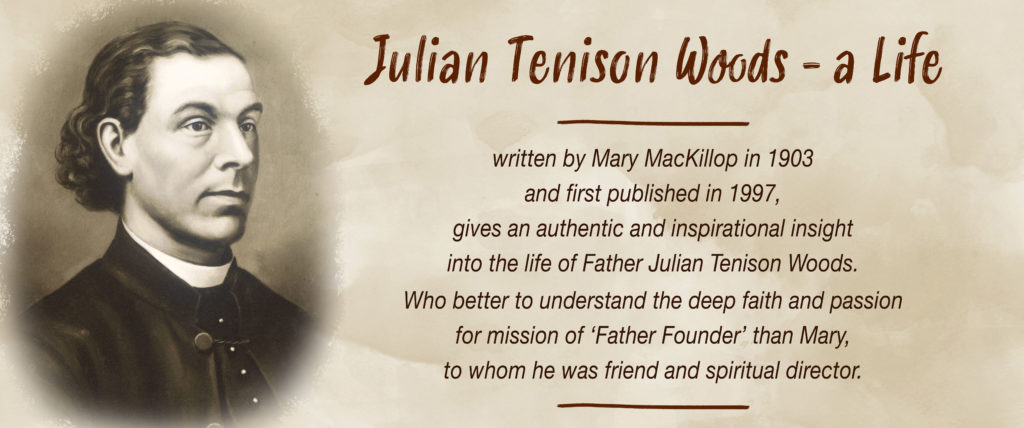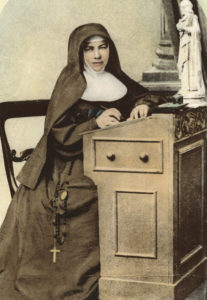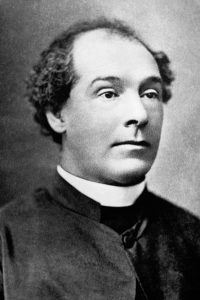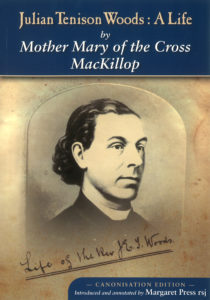
Chapters 12th, 13th and 14th
Among the residents of Portland who became intimate friends of Father Woods was the MacKillop family. Mr MacKillop was the eldest brother of Mrs Alex Cameron of Penola Station, and Mrs MacKillop the sister of Mr D McDonald also of Penola…[1]
The Catholic School in Portland required a teacher and Miss MacKillop wrote to Father Woods on the subject. In reply, 30 August 1863 he said: ‘I think if you can take it for a time, so much the better. You might, until the school here is vacant…’[2]

Miss MacKillop took the Portland School and remained much longer than at first seemed probable. Father Woods wrote to her very frequently….[3] Miss MacKillop was acquiring in the Portland school the experience and practical knowledge which fitted her for the work she was designed for…[4]
During this winter there was very great sickness in the district and the priests were kept busy attending to sick calls; yet Father Woods continued his scientific papers, receiving for them sufficient remuneration to enable him to purchase a stock of medicines for the poor. This was a great pleasure to him, though not to the doctor, who was often indignant at the loss of patients.
But it was those who could ill afford medical aid who became the special object of the priest’s solicitude; and there are yet living many who were cured by him when no other treatment was successful…[5]
Towards the end of the year … [6] Father Woods wrote to Miss MacKillop, asking could she come at once to commence the school so long talked of; or, if that were impossible, could her sister come to open the school for the present.
The sister did so and commenced school in St Joseph’s Church with twelve children. The young teacher lived with her uncle and aunt until Miss MacKillop could come. This she did as soon as possible, intending to take a cottage and carry on the school therein; Father Woods agreeing with her that this school should be on purely Catholic principles.
However, it was impossible to rent a cottage for the purpose, therefore, a six-stalled stable was renovated by removing the stalls, flooring and lining the building, thus making a decent temporary school, a cottage being rented by Miss MacKillop for residence.
The new room was not ready until March – meanwhile the school was carried on in St Joseph’s Church…[7]

The condition of the aboriginals attracted much attention…[8] There was great mortality among the blacks that year, and Father Woods was busy mixing medicines, and attending to their temporal wants …[9]
What might have been done had Father Woods remained longer we know not…[10] but his days in the South East were nearly over, his peaceful quiet life was to come to an end…[11]
The Right Rev. L. B. Sheil, O.S.F., Archdeacon of Ballarat …[12] was consecrated Bishop of Adelaide on the 15 August 1866 in the Church of St Francis, Melbourne…[13] This was an important event in the life of Father Woods… [14]
He wrote …[15] The Bishop has asked me to come into town as his secretary…[16] It is decided now that I leave Penola after Christmas…[17] Surely God will draw good out of it all…[18]
On 19 September, he wrote to Miss MacKillop:
You will see by the papers that the die is cast and all our arrangements are made …[19] I am appointed Director General of Catholic Education, Chairman of the Board and Inspector of Schools throughout the diocese. I am also His Lordship’s Secretary…[20] All my pain at leaving Penola, and all the bitter regret I should feel at leaving so many and such friends is more than compensated for by having the sole control of Catholic Education placed in my hands.

This extract is taken from:
Chapters 12th, 13th and 14th of Julian Tenison Woods: A Life has been used with the kind permission of the Trustees of the Sisters of Saint Joseph 1997 and the publishers, St Paul’s Publications.
If you would like to read the full text, including an informative Introduction, footnotes and an index, this book is available online and from some Mary MacKillop Centres.
Carmel Jones rsj
Footnotes:
[1] Chapter 12th, p. 55
[2] Chapter 12th, p. 59
[3] Chapter 12th, p. 59
[4] Chapter 12th, p. 60
[5] Chapter 12th, p. 65
[6] Chapter 13th, p. 67
[7] Chapter 13th, p. 67
[8] Chapter 13th, p. 68
[9] Chapter 13th, p. 69
[10] Chapter 13th, p. 70
[11] Chapter 13th, p. 70
[12] Chapter 14th, p. 71
[13] Chapter 14th, p. 71
[14] Chapter 14th, p. 71
[15] Chapter 14th, p. 73
[16] Chapter 14th, p. 73
[17] Chapter 14th, p. 74
[18] Chapter 14th, p. 74
[19] Chapter 14th, p. 75
[20] Chapter 14th, p. 75
